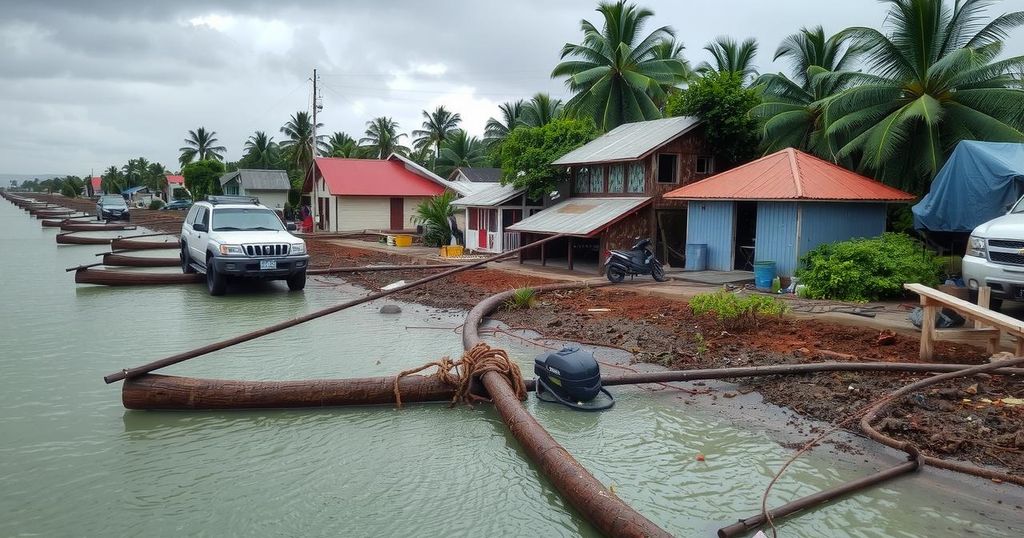World news
AFRICA, AP, BIEUVILLE, BRUNO RETAILLEAU, CAPE TOWN, COMOROS, CYCLING, EMERGENCY RESPONSE, EUROPE, EUROPEAN UNION, FRANCE, FRANCOIS -, FRANÇOIS - XAVIER BIEUVILLE, INDIAN OCEAN, MAMOUDZOU, MAYOTTE, MAYOTTE LA 1ERE, NATURAL DISASTERS, PARIS OLYMPICS, REUNION, SOMALIA, SOUTH AFRICA, TF1, XAVIER BIEUVILLE
Marisol Gonzalez
0 Comments
France Expedited Aid to Mayotte After Deadly Cyclone Chido
France is providing emergency aid to Mayotte after Cyclone Chido devastated the island, with officials fearing a death toll ranging from hundreds to thousands. The cyclone has severely damaged infrastructure, complicating rescue efforts amidst a backdrop of poverty and informal housing. As Chido continues its path towards the African mainland, neighboring countries are bracing for the potential impact.
On Monday, France mobilized urgent aid through maritime and aerial channels to the French overseas territory of Mayotte, which was devastated by Cyclone Chido. This cyclone, regarded as the most severe storm to strike the island in nearly a century, has raised fears among authorities regarding a staggering death toll potentially reaching the thousands. Officially, as of Monday morning, the confirmed fatalities stood at 14, but local officials indicated that the actual number could be much higher due to the island’s vulnerable and densely populated areas.
The cyclone wrought destruction upon Mayotte, an island province with approximately 300,000 inhabitants, on Saturday, resulting in catastrophic damage to its infrastructure, including the principal airport and hospital. The prefect of Mayotte, François-Xavier Bieuville, expressed the challenge of accurately assessing casualties, noting the prevalence of informal housing and the common practice of rapid burials within the Muslim community. Furthermore, the influx of undocumented migrants complicates the enumeration of those affected.
Interior Minister Bruno Retailleau arrived in Mamoudzou, the capital, expressing the difficulty in establishing a complete human toll given the scale of the disaster. As recovery efforts began, an additional 800 rescue personnel were dispatched to aid in the response. The cyclone’s winds, surpassing 220 kph (136 mph), categorized it as one of the most formidable storms the region has experienced, severely impacting Mayotte and straining available resources.
Cyclone Chido also affected neighboring islands, causing widespread concern as it continued on its path towards the African mainland, where more than 2 million people in Mozambique could be impacted. Authorities in Mozambique had already reported fatalities and initiated preparations for further emergencies as the cyclone advanced into their territory. The region has proven vulnerable to such natural disasters, with previous cyclones, including Idai and Freddy, resulting in significant loss of life in recent years.
Mayotte, an overseas department of France located in the Indian Ocean, faces socioeconomic challenges, making it the poorest territory within the European Union. It has been a point of migration for individuals from even less affluent regions, including Comoros and Somalia. Cyclones have historically posed severe risks to the island and surrounding territories, with the cyclone season occurring between December and March. Cyclone Chido serves as a grim reminder of the vulnerability of these regions to climatic catastrophes, with previous storms causing thousands of fatalities in the past.
The devastation caused by Cyclone Chido highlights the dire humanitarian situation in Mayotte and underscores the urgent need for comprehensive disaster response mechanisms in vulnerable regions. Authorities continue to assess the damage and anticipate increased fatalities as rescue operations progress. With a history of cyclones affecting the region, it is crucial for France and international aid organizations to evaluate and enhance their preparedness for such natural disasters to mitigate future impacts.
Original Source: apnews.com




Post Comment